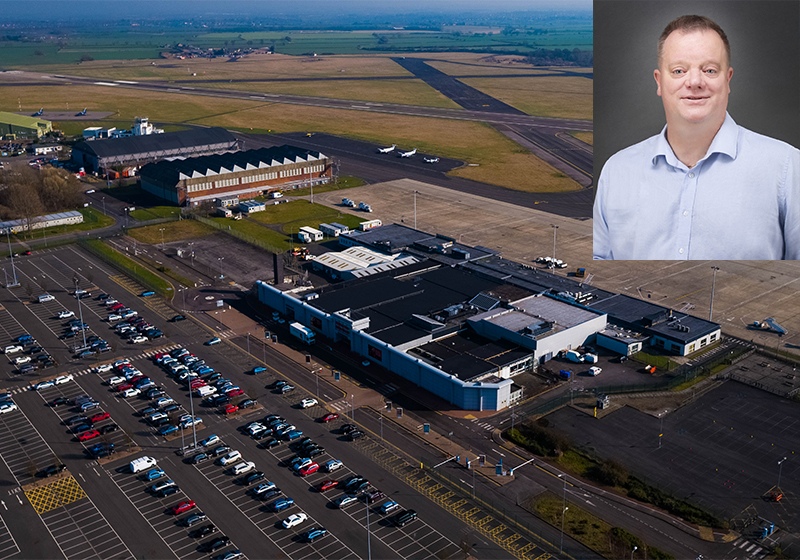Steven Verhasselt Joins Teesside Airport to Boost Cargo Operations
Steven Verhasselt spent 20 years turning Liege Airport from a small regional airport into a cargo juggernaut, handling two-thirds of all European Air Freight.
Now the 52-year-old will be helping to steer Teesside’s cargo operation in a huge coup for one of the country’s newest Border Control Points (BCPs).
The Belgian national travels the globe speaking to contacts and clients in developing freight with his firm FB Cargo Strategy.
Steven said he spent the first four years putting in the groundwork at Liege to make it the powerhouse it is today.
He said: “It took a while, but it came good after we’d put the work in.
“We got perishables through Ethiopia, E-Commerce, and worked through Hong Kong and China. We offered a unique selling proposal by using our ingenuity around existing legislation.”
Steven’s background was in seed capital and venture capital before he made a move into aviation.
Within a decade, he’d built up a big bank of contacts – and he revealed what he loved most about his work in airfreight.
“What I like is on one hand, it’s really a global business but on the other it’s relatively small – meaning within ten years you knew everybody,” he said.
“There’s also a challenge with passenger travel at an airport. It means we have to be inventive in developing routes when compared to passenger travel. Every cargo route development is like its own mini-project – you have to be much more inventive.
“If I have a flight coming from Africa full of flowers and vegetables into the UK, the flowers are going to be sold and the vegetables are eaten.
“Passengers arrive at an airport and go home or to a hotel. Cargo can arrive – but if nobody deals with it, it can sit at an airport for years.
“Running cargo is much more than just running airside operations. It’s about customs, licence checks, border control, taking cargo to its final destination. That’s what makes it interesting.”
Teesside’s £2.5million state-of-the-art cargo facility has gone from strength to strength since it opened for business, and its status as one of the country’s newest BCPs means it can handle flowers, fruit and vegetables.
Linked by the A1(M) and A66 nearby, and the East Coast Mainline, in Darlington, the Airport’s freight facility is ideally placed in the heart of Britain to make the most of road and rail links. It can serve some 95% of the country’s businesses in just six hours.
Teesside also offers benefits as a customs zone as part of the Teesside Freeport.
This year saw FedEx, the world’s largest transportation company, sign a five-year deal with Teesside for an airfreight handling facility to meet growing demand – with eight additional inbound and outbound flights a week.
When it came to the wider opportunities in airfreight, Steven explained there were plenty to be had.
He added: “The potential for cargo is as it’s always been.
“Resources tend to go to passenger services – that’s seen as more important to an airport’s stakeholders.
“In certain airports, cargo is pushed on site. But when you see what is happening in UK, you see very few flights for cargo in London airports. For cargo, if organised, Teesside is definitely a competitor.
“You can compete on speed and compete on reliability – that’s the benefit of a regional airport. Speed is important but in certain areas, such as automotive freight, reliability is key.
“The market offer in Northern England is under-developed and there may well be an opportunity there. You’ve also got Brexit which hasn’t quite been digested – companies are still working it out and there are logistic challenges so there are opportunities there.
“I see the potential to develop some very sustainable long-term successes – be it Africa with perishables, business in the US, and maybe Asia with stopovers.”
However, as his experience building Liege showed, Steven explained how expanding Teesside’s cargo operations would require patience.
“You also need to be wise where we position ourselves – we’re not going to be landing 747s,” he added.
“It’s a challenge and it’s going to take time, but there are always opportunities in the short term – just look at the port strike on the US East Coast.
“We are going to get the groundwork done and position ourselves – but we’re also going to look at the short-term opportunities as well. That’s the balance in the whole approach.
“The key is to be on top of it.”
Steven will be supported by doyen of cargo and colleague at FB Cargo Strategy, Koen Servaes, who has 38 years of aviation experience under his belt.
Phil Forster, Managing Director of Teesside Airport, was delighted to welcome the pair aboard as part of the agreement.
He said: “Having Steven and Koen boosting our team is a huge coup for us. Both are giants in the cargo industry – and what they’ve done throughout their careers is testament to the hard work, contacts and talent they have.
“To have access to their vast knowledge and expertise is invaluable and we’re delighted they’ve seen our potential and come on board.
“Our cargo operation means we’re perfectly placed for distribution, our Business Park is growing, and we’ve put the building blocks in place to welcome more firms to our site to reap the benefits of our customs zone.
“It’ll take time, but this is a huge boost to our efforts to make Teesside an economic engine for our region and put us firmly on the airfreight map.”














